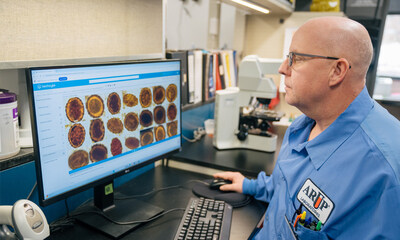ARUP Laboratories today announced the publication of an article in the Journal of Clinical Microbiology describing the company’s validation of a deep convolutional neural network (CNN) to detect parasites in concentrated wet mounts of stool.
For decades, detection of gastrointestinal parasites has relied on traditional microscopy, which is a labor-intensive process that requires highly trained personnel. By leveraging the use of artificial intelligence (AI) to screen for negative specimens, the assay reduces the burden on laboratory staff while offering improved clinical sensitivity, limit of detection, and diagnostic yield.
In March 2025, ARUP expanded its AI screening algorithm for the detection of human parasites to include the wet-mount part of the test, becoming the world’s first laboratory to apply AI screening to the entire ova and parasite testing process.
“Our validation studies have demonstrated the AI algorithm has better clinical sensitivity, improving the likelihood that a pathogenic parasite may be detected,” said Blaine Mathison, BS, M(ASCP), technical director of Parasitology at ARUP and lead author of the article. Mathison, who has more than 25 years of experience in parasitology, has spent years working on the implementation of AI.
The CNN was trained with 4,049 unique parasite-positive specimens sourced from around the world. The specimens contained rare parasites such as Schistosoma japonicum and Paracapillaria philippinensis from the Philippines and Schistosoma mansoni from Africa. The clinical validation included 25 classes of parasites.
“This was really a robust study when you consider the number of organisms and positive specimens used to validate the AI algorithm,” Mathison said. “It has been a groundbreaking effort, and what we’ve accomplished is remarkable.”
The study found that AI detected an additional 169 organisms that were not originally identified by a technologist. After discrepancy analysis, the positive agreement between AI and manual review was 98.6%.
“We are identifying more organisms than we would without the AI, which improves diagnosis and treatment for patients who are affected,” said Adam Barker, PhD, ARUP chief operations officer.
Furthermore, a limit of detection study found that AI consistently detected more organisms at lower dilutions of parasites than the technologists did, regardless of their experience level.
In August, ARUP received a record number of specimens for ova and parasite testing. The efficiency gained through AI made it possible for the lab to keep up with the demand without compromising quality.
“An AI algorithm is only as good as the personnel inputting the data,” Barker said. “We have phenomenal staff who have used their extensive knowledge and skills to build an exceptional AI solution that benefits not just the laboratory, but also patients.”
ARUP developed the AI solution in partnership with Techcyte, a leader in the development of AI-powered solutions for anatomic and clinical pathology.
In 2019, ARUP was the first laboratory in the world to implement AI, in collaboration with Techcyte, for the trichrome part of the ova and parasite exam. The article describing the validation of that approach was published in the Journal of Clinical Microbiology in 2020.
ARUP will continue to develop innovative technologies, including AI solutions, to improve diagnostic capabilities and laboratory processes. ARUP has already implemented an AI solution to improve Pap testing and has other AI innovations in development.
